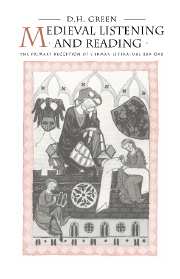Book contents
- Frontmatter
- Contents
- Preface
- List of abbreviations
- PART I Preliminary problems
- PART II Three modes of reception
- Introduction
- 3 Criteria for reception by hearing
- 4 Survey of reception by hearing
- 5 Criteria for reception by reading
- 6 Survey of reception by reading
- 7 Criteria for the intermediate mode of reception
- 8 Survey of the intermediate mode of reception
- PART III Conclusions
- Appendix Middle High German ‘lesen’ = ‘to narrate, recount, tell’
- Notes
- Bibliographical index
- Index of names
6 - Survey of reception by reading
Published online by Cambridge University Press: 04 September 2009
- Frontmatter
- Contents
- Preface
- List of abbreviations
- PART I Preliminary problems
- PART II Three modes of reception
- Introduction
- 3 Criteria for reception by hearing
- 4 Survey of reception by hearing
- 5 Criteria for reception by reading
- 6 Survey of reception by reading
- 7 Criteria for the intermediate mode of reception
- 8 Survey of the intermediate mode of reception
- PART III Conclusions
- Appendix Middle High German ‘lesen’ = ‘to narrate, recount, tell’
- Notes
- Bibliographical index
- Index of names
Summary
That evidence for reading in this chapter occurs less frequently than earlier for hearing shows that recital and listening were predominant modes in the Middle Ages, persisting alongside individual reading, which gained importance only towards 1200 and increasingly after that. Had this survey covered the fourteenth century as well it would have yielded very different results.
With the acoustic reception in Chapter 4 we began each section with some words on the role of orality in that genre. In this chapter we shall preface each section with remarks on the way in which the genre found its way on to parchment before considering works with pointers to an individual reader. Strictly speaking, writing underlies not merely a text read by an individual, but also one read out to listeners, but it is more fitting to include this literate aspect in a chapter devoted to the literate act of reading. Whereas in Chapter 4 the argument often turned on the verb hoeren, now the problem lies with lesen. The act of reading is suggested when this verb implies reception of a work by someone for himself, rather than transmission to others by recital. The reasons suggesting the former instead of the latter were discussed at the close of the last chapter.
Functional literature
If magic charms and blessings had to be pronounced to be effective they have reached us because they were also written.
- Type
- Chapter
- Information
- Medieval Listening and ReadingThe Primary Reception of German Literature 800–1300, pp. 150 - 168Publisher: Cambridge University PressPrint publication year: 1994



